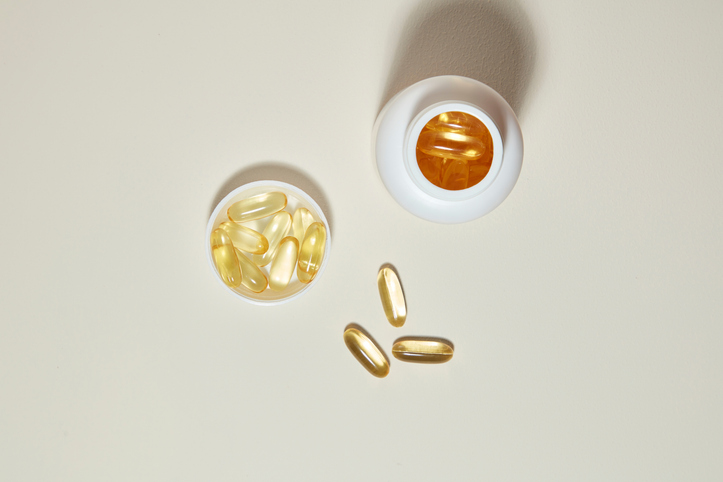The 7 Best Female Hormone Balance Supplements
Sep 30, 2025
Struggling with persistent fatigue, unexplained weight shifts, or emotional volatility you can’t quite pin down? These may be signals of underlying hormonal imbalances—subtle at first, but often with wide-ranging impacts on metabolism, mood, sleep, and reproductive health. This article explores several evidence-based supplements frequently utilized in comprehensive treatment plans for hormonal balance. But before we dive into specific tools, it’s essential to emphasize that hormones do not exist in isolation: they communicate across multiple systems. Addressing them effectively requires trained clinical evaluation, lab testing, and a strategy that goes beyond guessing and grabbing a supplement off the shelf.
Signs of Hormonal Imbalance
Hormonal imbalances rarely present with just one obvious symptom. Instead, they ripple through multiple body systems, often showing up as: stubborn weight gain (especially abdominal), intense fatigue that doesn’t resolve with sleep, disrupted menstrual cycles, migraines, acne or cystic skin flares, low libido, hair loss or thinning, night sweats, and sleep disturbances. Some women also notice heightened anxiety, difficulty concentrating, or mood instability that seems disproportionate to life circumstances.
These aren’t just nuisances—they’re biochemical signals that your hypothalamic–pituitary–adrenal–ovarian–thyroid network (HPTAO axis) may be dysregulated. This is why testing before supplementing matters. Adding in a single “hormone balancing” product without understanding whether the imbalance stems from low progesterone, high androgens, poor thyroid conversion, cortisol dysregulation, or impaired estrogen metabolism is like patching one hole in a bucket that actually has five leaks. It might buy you some time, but the water will still escape. A trained provider can help identify root imbalances and ensure the interventions chosen—whether dietary, lifestyle, or supplemental—work with your unique physiology rather than against it.
Why Hormone Balance is Essential for Health
Hormones orchestrate nearly every vital function: blood sugar stability, energy production, bone density, fertility, immune resilience, and even how you respond to stress. When they slip out of balance, the downstream effects are profound. Low estrogen, for example, isn’t just about hot flashes—it can accelerate bone loss, alter lipid metabolism, and change neurotransmitter activity in the brain, contributing to depression and memory challenges. Dysregulated cortisol doesn’t just leave you feeling “stressed”—it can flatten your circadian rhythm, impair thyroid hormone conversion, and lead to insulin resistance. Elevated androgens can trigger acne, scalp hair loss, or ovulatory dysfunction (as seen in PCOS), while low progesterone may manifest as anxiety, premenstrual insomnia, or heavy, painful periods. In short, maintaining hormonal balance is central to long-term health and disease prevention. And while targeted supplements can play an important role, they are most effective when integrated into a personalized plan guided by proper testing, root-cause analysis, and careful monitoring.
Chasteberry (Vitex angnus-castus)
Chasteberry has been studied extensively for its effects on the hypothalamic–pituitary–gonadal (HPG) axis. It appears to act primarily at the pituitary gland, where it modulates prolactin secretion. Elevated prolactin can suppress luteinizing hormone (LH) and ovulation, leading to irregular cycles, infertility, and luteal phase deficiency. By normalizing prolactin levels, Vitex can indirectly support healthier progesterone production and more regular ovulation. Clinical trials have shown Vitex to reduce premenstrual mastalgia, mood disturbances, and cycle irregularities, particularly in women with PMS or mild hyperprolactinemia. Importantly, it is not a blanket “estrogen booster”—its effects depend on where the imbalance lies. Because of its hormone-modulating activity, Vitex should always be used under the guidance of a provider, especially in those with hormone-sensitive conditions or on fertility medications.
Magnesium
Magnesium is a critical cofactor in more than 300 enzymatic reactions, many directly tied to hormone regulation. It supports the conversion of cholesterol into steroid hormones, helps regulate insulin signaling, and facilitates the peripheral conversion of thyroid hormone (T4 to the active T3). It also plays a role in gamma-aminobutyric acid (GABA) receptor function, making it essential for calming the nervous system and reducing cortisol-driven excitability. Research shows that magnesium supplementation can improve insulin sensitivity, reduce PMS-related mood and physical symptoms, and support sleep quality. Magnesium deficiency is surprisingly common due to soil depletion and modern diets, making this mineral a foundational support for adrenal, thyroid, and reproductive hormone balance. Food-first strategies (pumpkin seeds, leafy greens, legumes) are ideal, with supplementation reserved for those who demonstrate clinical need or documented deficiency.

Omega-3 Fatty Acids
Omega-3 fatty acids (EPA and DHA) are integral to hormone signaling because they modulate cell membrane fluidity, which directly influences receptor sensitivity. They are also precursors to anti-inflammatory eicosanoids and resolvins, which help regulate the chronic, low-grade inflammation that underpins many hormone imbalances (e.g., PCOS, endometriosis, perimenopause). Randomized controlled trials demonstrate omega-3 supplementation improves insulin sensitivity in women with PCOS, reduces depressive symptoms in perinatal women, and supports cardiovascular and brain health during menopause. Clinically, they may also enhance progesterone sensitivity by improving receptor binding. High-quality sourcing matters: rancid or oxidized fish oil negates benefits and can add oxidative stress, so third-party testing for purity and oxidation is essential.
Vitamin D
Vitamin D functions more like a steroid hormone than a vitamin. Its active form (calcitriol) binds to nuclear receptors in nearly every tissue, influencing gene transcription involved in immune regulation, insulin sensitivity, ovarian function, and thyroid activity. Deficiency has been linked to irregular cycles, infertility, autoimmune thyroid disease, PCOS, and depressive symptoms. A 2018 systematic review found vitamin D supplementation improved menstrual regularity and metabolic parameters in women with PCOS. Adequate levels are also protective for bone health, especially in the estrogen-deficient state of menopause. Because deficiency is common—especially in northern latitudes—testing 25(OH)D is key before supplementing. Too much vitamin D can drive calcium dysregulation, so individualized dosing under medical supervision is advised.
Ashwagandha (Withania somnifera)
Ashwagandha is an adaptogen with well-documented effects on the hypothalamic–pituitary–adrenal (HPA) axis. By modulating cortisol output, it reduces the “wired and tired” state of chronic stress. Several randomized controlled trials show significant reductions in serum cortisol, improved sleep, and enhanced resilience to stress in individuals taking standardized ashwagandha extract. Mechanistically, ashwagandha may increase GABAergic activity in the brain and support thyroid function by stimulating T4 production. For women experiencing stress-related cycle irregularities, fatigue, or perimenopausal sleep disturbance, ashwagandha can be a powerful adjunct—but it should be tailored, as not all patients tolerate adaptogens the same way.
Prebiotics, Probiotics, and Postbiotics
The gut microbiome is an often-overlooked regulator of hormone balance. Through the estrobolome—a collection of bacterial genes that influence estrogen metabolism—gut microbes directly affect circulating hormone levels. When dysbiosis occurs, excess β-glucuronidase activity can lead to the reabsorption of estrogen metabolites, contributing to symptoms like heavy bleeding, PMS, fibroids, and endometriosis flare-ups.
Prebiotics are nondigestible fibers (such as inulin, resistant starch, and fructooligosaccharides) that selectively feed beneficial gut bacteria. They enhance microbial diversity, promote short-chain fatty acid (SCFA) production, and reduce systemic inflammation—all of which positively influence insulin signaling, ovarian function, and immune tolerance. Clinical trials have linked prebiotics to improved metabolic outcomes in PCOS and better bowel regularity, which is key for estrogen clearance.
Probiotics introduce live beneficial strains, particularly Lactobacillus and Bifidobacterium, which help maintain a healthy vaginal and intestinal ecosystem, lower inflammation, and improve barrier integrity. Certain strains (e.g., Lactobacillus rhamnosus GG, Bifidobacterium lactis) have been studied for reducing systemic inflammation and supporting metabolic regulation in women with PCOS. The effectiveness of probiotics depends heavily on strain specificity and dose, underscoring the need for provider guidance.
Postbiotics are the beneficial metabolites produced by microbes, including SCFAs like butyrate, acetate, and propionate. These compounds act as signaling molecules, strengthening the gut barrier, lowering inflammation, and even influencing appetite-regulating hormones (GLP-1, PYY). Butyrate, in particular, improves insulin sensitivity and modulates immune pathways that are often dysregulated in hormone-related conditions. Emerging supplements now deliver postbiotics directly, offering therapeutic benefits without requiring live organisms.
A comprehensive gut strategy often layers these approaches: feeding beneficial bacteria with prebiotics, seeding the system with targeted probiotics, and ensuring the downstream benefits of postbiotic production. When tailored appropriately, this triad supports estrogen metabolism, stabilizes blood sugar, enhances stress resilience, and creates the biochemical environment for hormone balance to take root.
B Vitamins
B vitamins act as enzymatic cofactors in nearly every step of hormone production and metabolism. Vitamin B6, for instance, aids in neurotransmitter synthesis (serotonin, dopamine, GABA) and supports estrogen clearance through the liver’s methylation pathways. B12 and folate are required for DNA synthesis and methylation, processes that influence ovarian function and early pregnancy outcomes. Studies indicate B6 can reduce PMS-related mood symptoms, while folate and B12 supplementation are associated with improved ovulatory function and reduced risk of miscarriage. These vitamins are best obtained through a combination of food sources (leafy greens, salmon, eggs) and supplementation as clinically indicated, particularly in those with genetic variants (e.g., MTHFR) or dietary restrictions.

Addressing Hormonal Imbalances Naturally
While supplements can play a supportive role, the foundation of hormonal health rests in daily habits that recalibrate the HPTAO axis (hypothalamic–pituitary–thyroid–adrenal–ovarian). Natural strategies don’t just “make you feel better”—they literally shift hormone signaling, receptor sensitivity, and circadian rhythm biology.
• Metabolic Balance: Overeating—especially refined carbohydrates—can drive insulin resistance, which disrupts ovarian function and elevates androgens (as in PCOS). Conversely, consistent meals anchored in protein, fiber, and healthy fats stabilize blood sugar and reduce cortisol surges.
• Movement: Exercise improves insulin sensitivity, enhances mitochondrial energy production, and modulates estrogen metabolism through upregulation of hepatic enzymes (CYP1A1, CYP1B1). Strength training in particular supports bone density and testosterone balance.
• Anti-inflammatory fats: Dietary omega-3s and monounsaturated fats support leptin and ghrelin regulation, impacting appetite and reproductive signaling. They also provide substrates for anti-inflammatory prostaglandins, which influence menstrual pain and immune tolerance.
• Circadian alignment: Light exposure in the morning stimulates the suprachiasmatic nucleus (the body’s master clock), improving cortisol awakening response and downstream thyroid and ovarian signaling. Limiting blue light at night protects melatonin secretion, which influences both sleep and ovarian steroidogenesis.
• Gut health: High-fiber diets (especially resistant starch and prebiotic fibers) nourish the microbiome, reduce β-glucuronidase activity, and improve estrogen clearance. Smoking cessation and alcohol reduction further protect estrogen detoxification pathways and liver function.
Sleep and stress reduction deserve special emphasis. Even one week of sleep deprivation can increase evening cortisol and impair glucose tolerance, setting the stage for thyroid and sex hormone disruption.
Mindfulness, yoga, and parasympathetic activation practices rewire the stress response and reduce sympathetic overdrive. In sum, these foundational habits create the physiological conditions for supplements (and, when appropriate, medications) to work more effectively.
Creating a Personalized Supplement Plan
When it comes to supplementation, personalization is non-negotiable. What looks like “estrogen dominance” in one woman may actually be poor progesterone production, sluggish thyroid conversion, or cortisol overdrive in another. Without testing and provider guidance, supplementation can become trial-and-error at best—and counterproductive at worst. A trained clinician will:
1. Assess patterns and labs — evaluating hormone panels, thyroid markers, glucose/insulin metrics, nutrient status, and sometimes gut or adrenal testing.
2. Prioritize interventions — deciding whether foundational changes, targeted nutrients, or adaptogens are most appropriate in sequence (e.g., correcting vitamin D deficiency before layering in phytoestrogens).
3. Tailor dosing and forms — ensuring therapeutic (not just “multivitamin-level”) doses are used, and considering delivery method (e.g., magnesium glycinate for calming vs magnesium citrate for motility).
4. Monitor and adjust — repeating labs or reassessing symptoms to ensure interventions are moving physiology in the right direction.
This layered approach recognizes that supplements are not stand-alone fixes but tools within a broader framework. When integrated into a multifaceted plan—anchored in nutrition, lifestyle, and root-cause medicine—they become powerful levers for restoring hormone communication and overall vitality.
If you’re tired of trying to self-diagnose and piece together solutions, it’s time for a more comprehensive approach. Our Signature Offering gives you the full support of our naturopathic physicians, registered nurses, and functional nutritionists—working together to uncover the root of your hormone imbalances and create a clear, customized plan for restoring your energy, balance, and vitality. Book your free 15-minute Discovery Call with Dr. Corina Dunlap today to explore whether this program is right for you.
Sources
https://pubmed.ncbi.nlm.nih.gov/28237870/
https://pubmed.ncbi.nlm.nih.gov/12809367/
https://pubmed.ncbi.nlm.nih.gov/29063202/
https://pubmed.ncbi.nlm.nih.gov/35565682/
https://pubmed.ncbi.nlm.nih.gov/34092248/
https://pubmed.ncbi.nlm.nih.gov/35184264/
https://pubmed.ncbi.nlm.nih.gov/34371930/
https://pubmed.ncbi.nlm.nih.gov/30111738/
https://pubmed.ncbi.nlm.nih.gov/29860183/
https://pubmed.ncbi.nlm.nih.gov/27484441/
https://pubmed.ncbi.nlm.nih.gov/28107851/
https://pubmed.ncbi.nlm.nih.gov/33670644/
https://pubmed.ncbi.nlm.nih.gov/30400199/
https://pubmed.ncbi.nlm.nih.gov/37111543/
https://pubmed.ncbi.nlm.nih.gov/34858513/
https://pubmed.ncbi.nlm.nih.gov/38003702/
https://pubmed.ncbi.nlm.nih.gov/39599701/
https://pubmed.ncbi.nlm.nih.gov/37259345/
https://pubmed.ncbi.nlm.nih.gov/35972231/
https://pubmed.ncbi.nlm.nih.gov/31879178/
https://pubmed.ncbi.nlm.nih.gov/36438768/
Unlock Your Hormone Health With Our Free Checklist
You deserve to know what is going on with your body and to understand why (or even IF) you have hormonal imbalances.
So we created this FREE resource to help guide you with some of the top labs and tests to consider.







